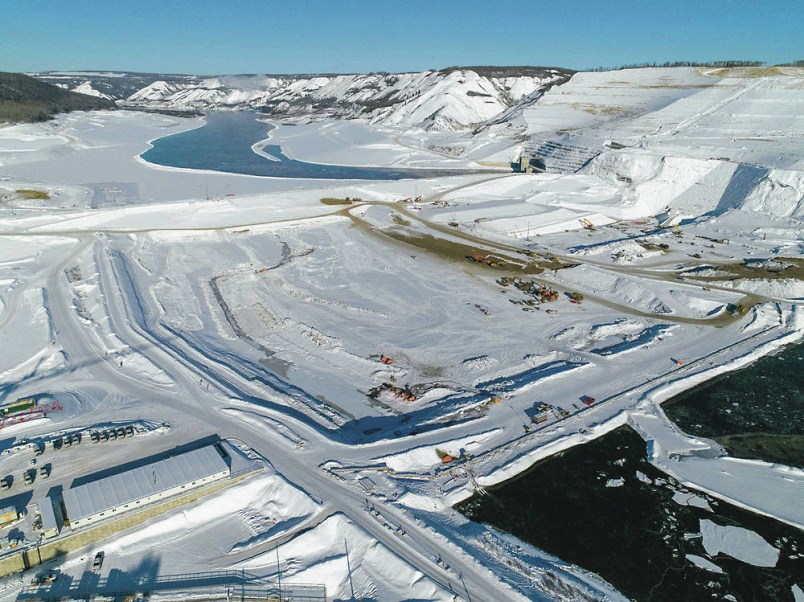Last week, David Eby announced a massive electrification plan to supply industrial customers, residences, transit systems and more with clean power. The problem is, B.C. doesn’t have enough electricity as it is, a problem exacerbated by the NDP’s own policies.
As the Energy Futures Initiative highlighted last week, B.C. has been newly identified by the North American Electric Reliability Corporation as being potentially ‘at-risk’ in terms of reliability as soon as 2026.
Indeed, B.C. imported a record amount of electricity last year (20 percent of total needs and nearly twice the future output of the Site C dam). These imports came at a cost of $450 million, when B.C.’s abundance of natural resources should allow the province to reap revenues through exports rather than spending them on imports.
Having spent years of my own career building the case for Site C, I am only too aware of the fact that the very project Eby is counting on to power his electrification plans is one that his own party fought tooth and nail. One of the reasons for their opposition? B.C. wouldn’t need the power.
Today, as we import electricity from our neighbours, we can be thankful that BC Liberal Premier Gordon Campbell had the foresight in 2010 to announce Site C, knowing that B.C. would eventually need it. The same goes for his successor, Christy Clark, who made the final decision to proceed, again in the face of fierce opposition from the NDP. It was only because the BC Liberals consciously got Site C to the “point of no return” that the NDP made the reluctant decision to continue with it.
The story about independent power is similar. The NDP claimed the power was not needed and shut down the BC Liberals’ ‘Standing Offer Program’ that sought the development of small-scale renewable energy projects. At the time, the NDP claimed “there is no need for new electricity supplies for the foreseeable future.”
They also scrapped the BC Liberal’s electricity self-sufficiency policy, with the result being the import, at great cost, of fossil fuel-fired power (60 percent of B.C.’s imports last year were generated using fossil fuels).
More recently, NDP policies led to the rejection of Fortis BC’s $327 million proposal to increase natural gas capacity in the Interior. The rejection was based in part on the NDP’s ill-conceived CleanBC Plan that demands the replacement of natural gas heating with electricity. It ignores the fact that the resulting demand is not matched by the electricity B.C. generates.
In effect, the NDP is denying needed gas infrastructure to meet home-heating needs in the name of reducing reliance on fossil fuels, while actually increasing B.C.’s need to import electricity generated by (you guessed it) fossil fuels.
The B.C. government claims to have a plan to meet electricity needs through Site C’s 5,100 gigawatt hours of energy, combined with a ‘call for power’ that will buy electricity from independent producers. However, the IPPs they’re pitching are too little, too late. They are years from being built, with the ‘call’ for just 3,000 gigawatt hours yet to actually go out. Even with Site C, this call will not make up for the over 10,000 gigawatt hours imported by B.C. last year, to say nothing of significant new demand from electrification plans.
It's also important to recognize that during B.C.’s recent cold snap, Fortis BC delivered almost double the energy of the entire BC Hydro network (nearly 22,000 megawatts at the highest point of demand, compared to BC Hydro’s 11,000 megawatts). This is because, even though very little electricity is generated by natural gas in B.C., about two-thirds of households use natural gas for heating.
Pretending natural gas doesn’t have an integral role in meeting B.C.’s energy demands is clearly disingenuous. Pretending that we can just transfer that demand to the BC Hydro system is even more so.
Worst of all is the fact that the very same government that opposed Site C, scrapped independent power generation, ended electricity self-sufficiency policies, and is now rejecting needed gas-fired home heating projects, is at the same time promising the mass-electrification of B.C.’s industry with a power supply that doesn’t exist.
While we can hope to rely on imports to pick up the slack, that plan isn’t always foolproof (as Alberta recently learned). Keeping the lights on and homes warm is a basic function that is put at risk by ideologically-driven opposition to a well-balanced system that uses a mix of resources to meet our energy needs.
The NDP’s credibility on this file is as lacking as the power needed to make good on their promises. The public may not realize it now, but you can count on them realizing it when they’re left out in the cold.
Caroline Elliott is a former advisor on the Site C project and is VP of BC United.




